Diet soft drinks have zero sugar and zero calories, but they still have a mixed reputation.
Are they actually bad for your health, and should you stop drinking them?
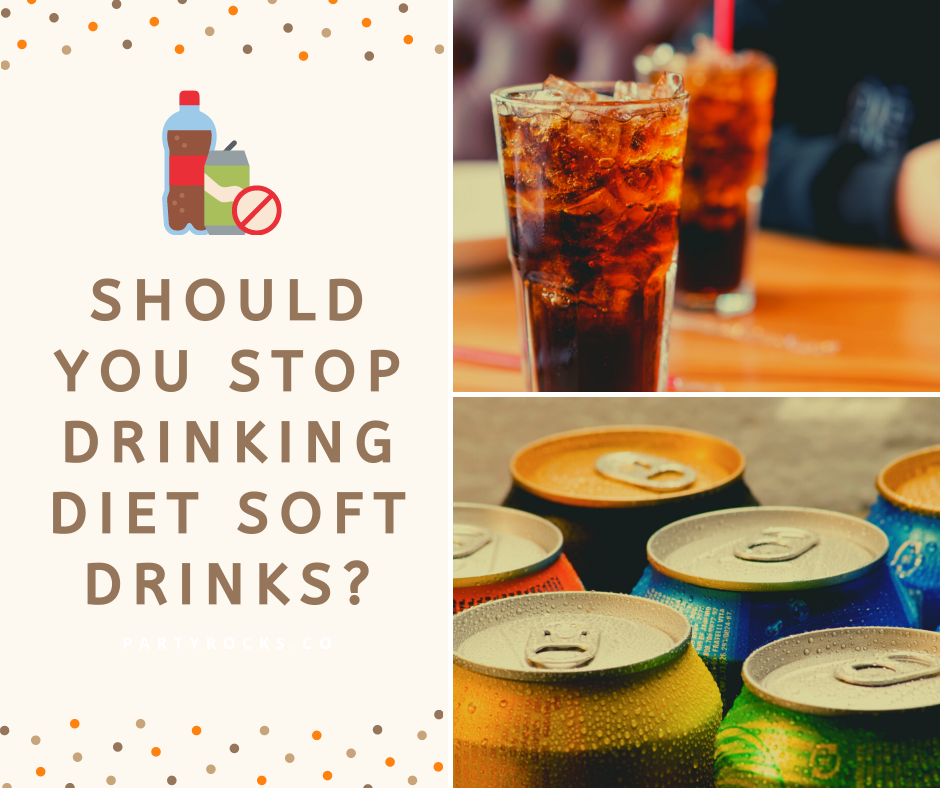
Well let's take a look at some of the more common questions around diet drinks...
1) Do Diet Soft Drinks Cause You To Gain Weight?
This is an odd one as diet drinks have zero calories and are often touted as promoting weight loss if combined with some of sort of low calorie eating plan.
Many large studies have shown a link between obesity and drinking diet drinks. However is this because these people are drinking diet soda because they're overweight and trying to lose pounds, or did their diet drinks cause them to gain weight?
Unfortunately the results from research so far has been inconclusive. This may be because many food studies are observational, which means that participants have to fill in questionnaires and self-report their own intake.
Will they remember accurately or even be entirely truthful?
Then lifestyle also has to be considered, such as physical activity, stress levels, smoking and other health risk factors.
2) Do Artificial Sweeteners Make You Gain Weight?
One of the key ingredients in diet soft drinks is artificial sweeteners.
There has been a nagging doubt for a while over whether artificial sweeteners might be linked to obesity. Which is kind of ironic!
There are a LOT of different artificial sweeteners out there. They're everywhere - in low calorie yoghurts, diet desserts, energy sports drinks and protein bars to name just a few.
Some of the more familiar names approved for use in the UK are:
Aspartame
Acesulfame potassium (acesulfame K)
Saccharin
Sucralose
Steviol glycosides (Stevia)
Xylitol
Sorbitol
These are all metabolised and interact with the body differently.
Even more confusingly many drinks manufacturers combine different artificial sweeteners to create a flavour that tastes more like sugar and therefore more yummy. Cunning!
Do you know for certain exactly what artificial sweeteners you're consuming in your food and drinks?
A 2019 trial compared 4 low calorie sweeteners with sucrose (table sugar) in overweight and obese adults.
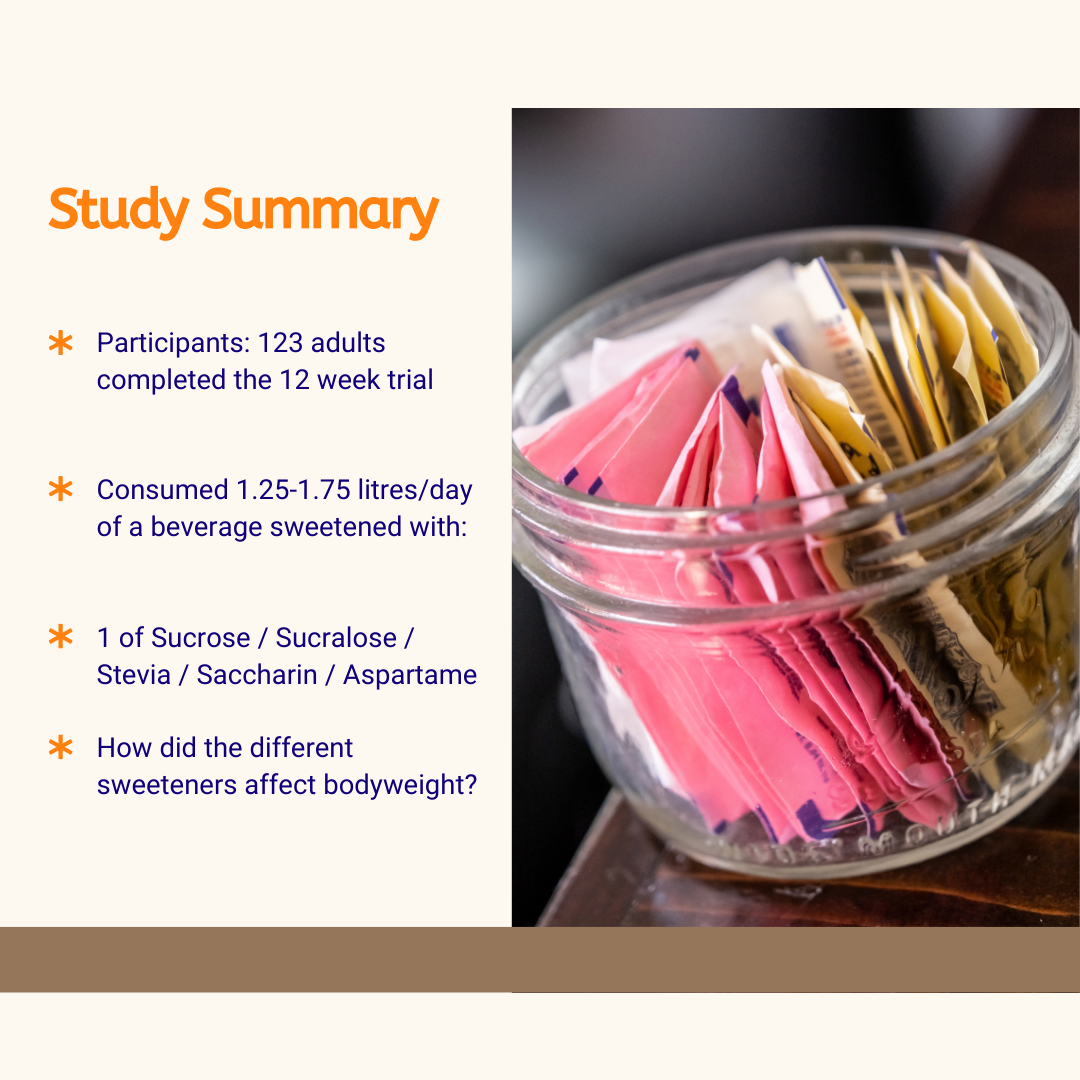
The study participants consumed the equivalent of 3 to 5 cans of diet soda daily for 3 months.
There was no significant weight change in those who consumed aspartame, stevia and sucralose,
Not surprisingly the participants who consumed table sugar gained an average of 1.86Kg. However those in the saccharin group also gained weight, on average 1.18Kg.
Caveats: This was a small trial study and the results haven't bee replicated so far.
But it does open up the possibility that not all artificial sweeteners are equal, and how the body reacts to them may be different.
3) Can Diet Drinks Make You Addicted To Sugar?
You tend to crave what you usually eat. So if your diet consists of daily doughnuts and cookies the chances are you'll have a sweet tooth.
But does consuming artificial sweeteners make you crave sweet things?
The theory that it does actually comes from studies done on rats. A 2019 meta-analysis found just 2 randomised studies in humans. The researchers added aspartame to the diets of overweight and obese subjects.
The results of these 2 studies?
Those who consumed aspartame had less desire to eat sweet foods.
There's some evidence that replacing your regular sugary soda with a diet alternative may help to appease your sweet cravings.
It's also feasible that this effect is highly individual, and what works for one person may not be effective for someone else.
4) Do Artificial Sweeteners Cause Cancer?
This scare came from a 1970's study linking saccharin to bladder tumours in rats.
But no such link has been found in humans to date when "consumed in reasonable amounts".
What's a reasonable amount?
Here are the Acceptable Daily Intakes (ADI) for artificial sweeteners as set by the European Food Safety Authority (EFSA):
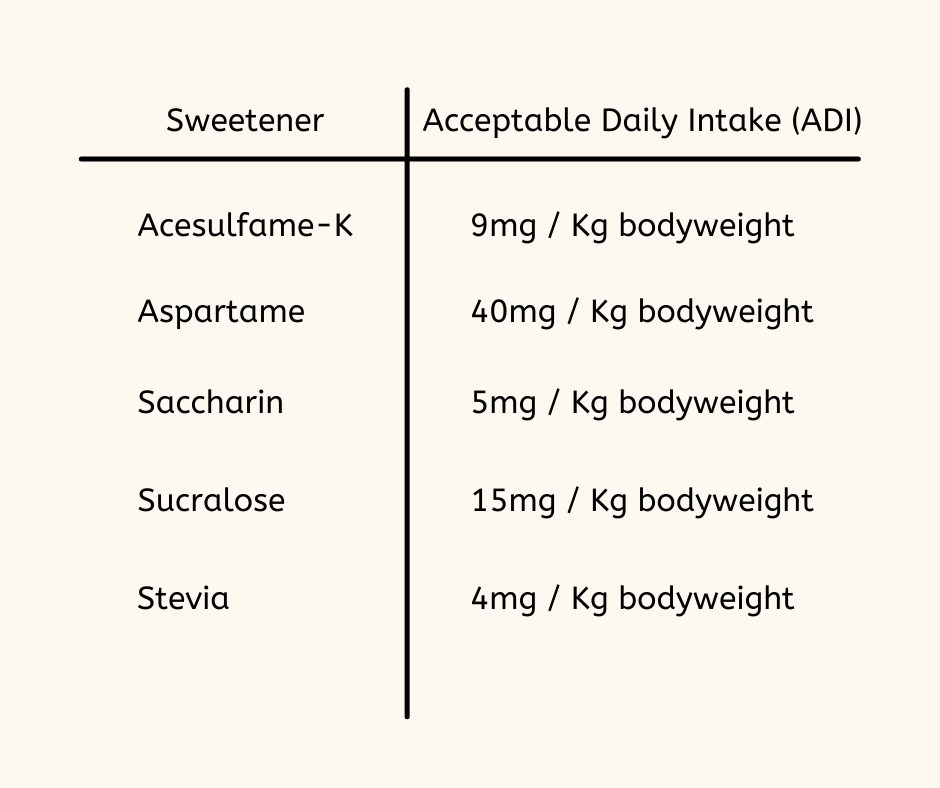
For reference a 330 ml can of:
Diet Coke contains 187.5mg Aspartame
Coke Zero contains 87mg Aspartame + 60mg Sucralose
Diet Pepsi contains 177mg Aspartame
Pepsi One contains 45mg Acesulfame-K + 60mg Sucralose
Sprite Zero contains 75mg Aspartame + 51mg Acesulfame-K
Remember too that artificial sweeteners are found in lots of foods, not just diet drinks.
Acceptable Daily Intake isn't necessarily the same as "reasonable amount" for health purposes.
5) Why Is It So Hard To Quit Diet Soft Drinks?
A lot of people will agree that diet drinks are addictive.
That's no accident.
Soft drinks are the highly processed beverage equivalents of convenience food favourites like chicken nuggets. ice cream, fried chicken, brownies, pizza and crisps.
These foods are scientifically engineered to target the pleasure centres of your brain and mouth. They're easily consumed, trigger warm fuzzy feelings of comfort and are darn irresistible.
Soft drinks stack sweetness, carbonation, caffeine and flavour enhancers to boost their appeal.
All of these boost the sensory properties of a diet soda and make it hyper-stimulatory so the brain thinks it's more refreshing than a glass of water.
Sensation-seekers can begin to crave this stimulation in their mouth and on their tongue.
Caffeine may also give soda drinkers a little buzz, like coffee.
A can of Diet Coke contains 46mg of caffeine. For comparison a short cup of Starbucks Americano or Latte contains 75mg of caffeine. But it all adds up if you drink a couple of cans of Diet Coke and have a lunchtime coffee.
The flavour enhancers that give each soft drink it's unique taste specifically target the dopamine centres of the brain, giving you a rush of pleasure with each sip. Your brain is hardwired to crave more of this reward.
So, Should You Stop Drinking Diet Soft Drinks?
Personally I don't believe there's a right or wrong answer here.
The health risks of being overweight or obese and carrying high levels of visceral body fat are well documented.
So if replacing a high calorie sugary beverage with a diet soft drink helps you to maintain a healthy weight the benefits probably outweigh any potential risks.
Or perhaps you've decided to cut out alcohol and a diet soda is the only acceptable social alternative in a restaurant or bar.
Always remember the big picture and look at the habits that have the biggest impact on your health:
Getting 7-9 hours of quality sleep most nights
Eating minimally processed foods most of the time
Eating enough lean protein and vegetables
Managing stress levels
Moving regularly
Limiting your alcohol consumption
If these aren't on point then trying to tweak your soft drinks habit may not make a significant or lasting impact on improving your health.
Having said that you may wish to consider these 2 health points:
1) Dental health - the acid in soft drinks is highly erosive to tooth enamel.
2) Acid reflux - carbonation (fizz), caffeine and acid are all triggers for acid reflux (heartburn). As all of these are found in soft drinks you may wish to minimise your intake if you're prone to heartburn.
What Can You Do?
1) Lose The "All or Nothing" Mindset
Have you noticed that when a food or drink is forbidden that you end up craving it even more?
Try placing beverages on a spectrum like this one from Precision Nutrition:
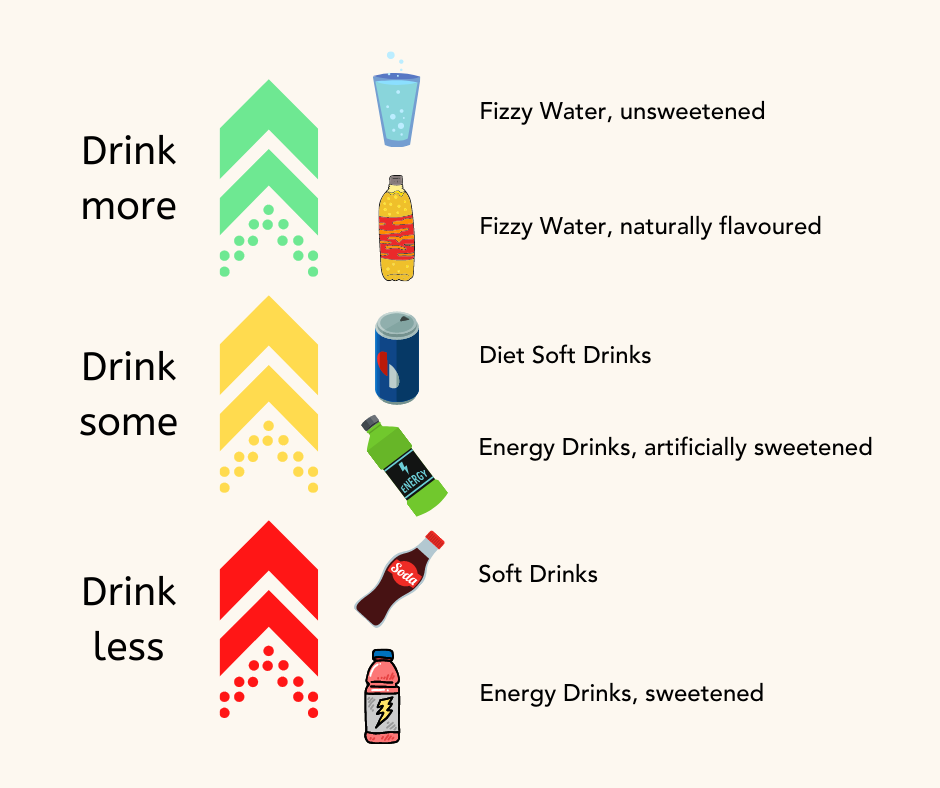
The aim here is to use the chart to make healthier choices and gradually shift your habits towards beverages in the "drink more" zone.
Small changes repeated consistently over time add up to new habits that serve you and your health better in the long term.
2) A Daily Beverage Guide
If you prefer more variety than just drinking water, coffee and tea here's a sample guide:
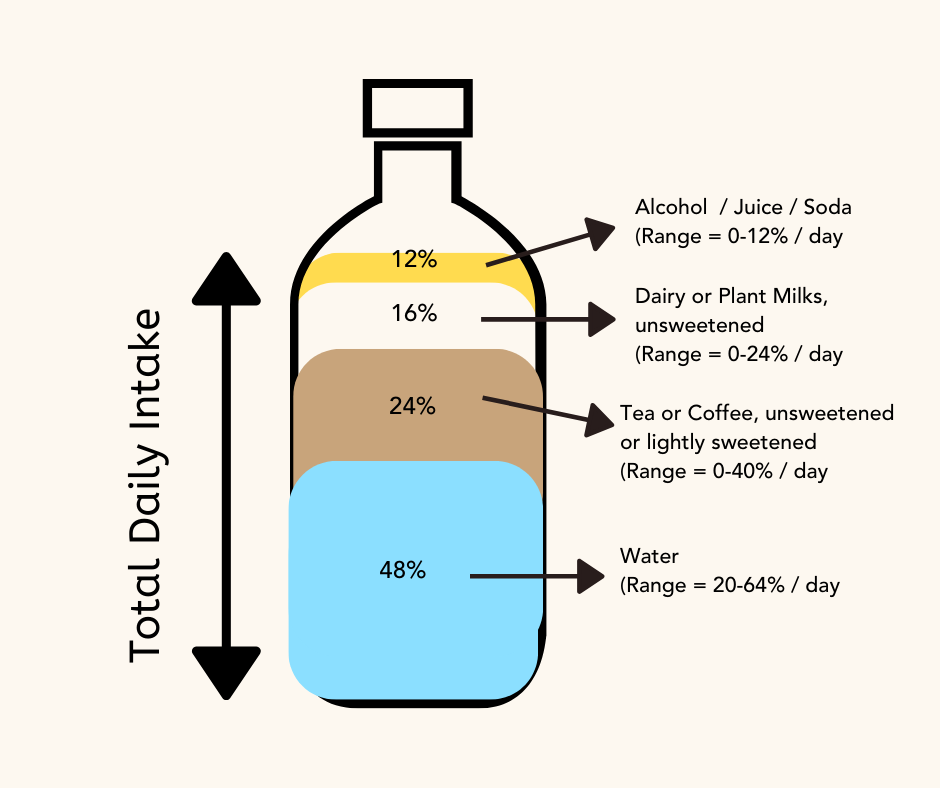
This gives you a framework to balance your choices whilst maintaining variety.
3) Does This Drink Serve You and Your Goals?
Consider if this drink:
Makes your body perform and function better or worse after consumption?
Makes you feel physically and mentally well or unwell after consumption?
Is highly processed?
Contains added sugar / artificial sweeteners / flavourings?
There is no one universal, one size fits everyone diet or eating plan. The same applies to drinks.
If you need help with your fitness, nutrition and health goals, or would like to chat further about changing old habits that aren't working for you any more, drop me a Messenger message on my Facebook profile HERE or email me at [email protected]
